Fleurs du Mal Magazine


Or see the index
.jpg)
Georg Trakl
(1887-1914)
Abendlied
Am Abend, wenn wir auf dunklen Pfaden gehn,
Erscheinen unsere bleichen Gestalten vor uns.
Wenn uns dürstet,
Trinken wir die weißen Wasser des Teichs,
Die Süße unserer traurigen Kindheit.
Erstorbene ruhen wir unterm Holundergebüsch,
Schaun den grauen Möven zu.
Früblingsgewölke steigen über die finstere Stadt,
Die der Mönche edlere Zeiten schweigt.
Da ich deine schmalen Hände nahm
Schlugst du leise die runden Augen auf,
Dieses ist lange her.
Doch wenn dunkler Wohllaut die Seele heimsucht,
Erscheinst du Weiße in des Freundes herbstlicher Landschaft.
Ein Winterabend
Wenn der Schnee ans Fenster fällt,
Lang die Abendglocke läutet,
Vielen ist der Tisch bereitet
Und das Haus ist wohlbestellt.
Mancher auf der Wanderschaft
Kommt ans Tor auf dunklen Pfaden.
Golden blüht der Baum der Gnaden
Aus der Erde kühlem Saft.
Wanderer tritt still herein;
Schmerz versteinerte die Schwelle.
Da erglänzt in reiner Helle
Auf dem Tische Brot und Wein.
Afra
Ein Kind mit braunem Haar. Gebet und Amen
Verdunkeln still die abendliche Kühle
Und Afras Lacheln rot in gelbem Rahmen
Von Sonnenblumen, Angst und grauer Schwüle.
Gehüllt in blauen Mantel sah vor Zeiten
Der Mönch sie fromm gemalt an Kirchenfenstern;
Das will in Schmerzen freundlich noch geleiten,
Wenn ihre Sterne durch sein Blut gespenstern.
Herbstuntergang; und des Holunders Schweigen.
Die Stirne rührt des Wassers blaue Regung,
Ein harnes Tuch gelegt auf eine Bahre.
Verfaulte Früchte fallen von den Zweigen;
Unsäglich ist der Vogel Flug, Begegnung
Mit Sterbenden; dem folgen dunkle Jahre.
.jpg)
Georg Trakl poetry
kempis.nl poetry magazine
More in: Archive S-T, Trakl, Georg
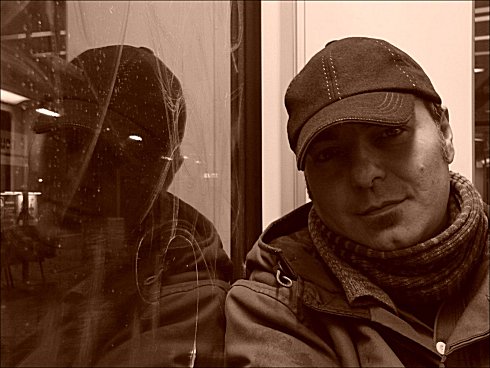
Exposition Vincent Berquez in Langham Gallery London
VINCENT BERQUEZ
NEW WORKS
7-20 February 2011
Langham Gallery
34 Lamb’s Conduit Street, London, WC1N 3LE
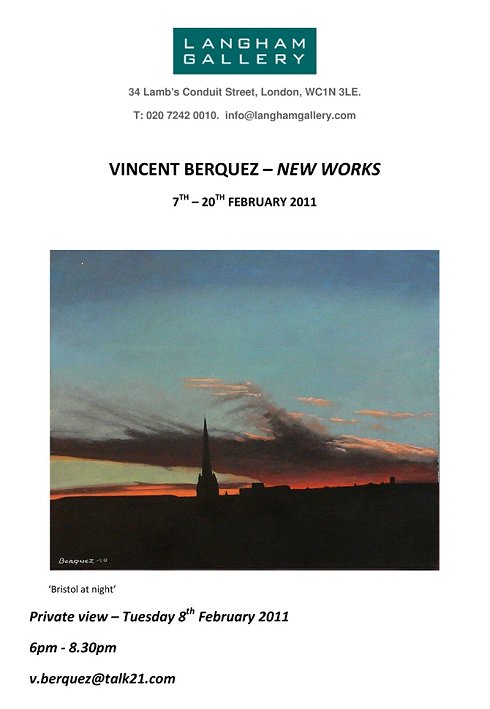
fleursdumal.nl magazine
More in: Berquez, Vincent, FDM in London, Vincent Berquez
.jpg)
Giacomo Leopardi
(1798-1837)
La sera del dì di festa
Dolce e chiara è la notte e senza vento,
E queta sovra i tetti e in mezzo agli orti
Posa la luna, e di lontan rivela
Serena ogni montagna. O donna mia,
Già tace ogni sentiero, e pei balconi
Rara traluce la notturna lampa:
Tu dormi, che t’accolse agevol sonno
Nelle tue chete stanze; e non ti morde
Cura nessuna; e già non sai nè pensi
Quanta piaga m’apristi in mezzo al petto.
Tu dormi: io questo ciel, che sì benigno
Appare in vista, a salutar m’affaccio,
E l’antica natura onnipossente,
Che mi fece all’affanno. A te la speme
Nego, mi disse, anche la speme; e d’altro
Non brillin gli occhi tuoi se non di pianto.
Questo dì fu solenne: or da’ trastulli
Prendi riposo; e forse ti rimembra
In sogno a quanti oggi piacesti, e quanti
Piacquero a te: non io, non già, ch’io speri,
Al pensier ti ricorro. Intanto io chieggo
Quanto a viver mi resti, e qui per terra
Mi getto, e grido, e fremo. Oh giorni orrendi
In così verde etate! Ahi, per la via
Odo non lunge il solitario canto
Dell’artigian, che riede a tarda notte,
Dopo i sollazzi, al suo povero ostello;
E fieramente mi si stringe il core,
A pensar come tutto al mondo passa,
E quasi orma non lascia. Ecco è fuggito
Il dì festivo, ed al festivo il giorno
Volgar succede, e se ne porta il tempo
Ogni umano accidente. Or dov’è il suono
Di que’ popoli antichi? or dov’è il grido
De’ nostri avi famosi, e il grande impero
Di quella Roma, e l’armi, e il fragorio
Che n’andò per la terra e l’oceano?
Tutto è pace e silenzio, e tutto posa
Il mondo, e più di lor non si ragiona.
Nella mia prima età, quando s’aspetta
Bramosamente il dì festivo, or poscia
Ch’egli era spento, io doloroso, in veglia,
Premea le piume; ed alla tarda notte
Un canto che s’udia per li sentieri
Lontanando morire a poco a poco,
Già similmente mi stringeva il core.
![]()
Giacomo Leopardi poetry
fleursdumal.nl magazine
More in: Archive K-L, Leopardi, Giacomo
Het Literaire Pleidooi
Elisabeth Leijnse over Patricia de Martelaere
Tijdens de eerste zitting van onze literaire rechtbank ontving rechter Philip Freriks Joke Linders en Gerda Dendooven die ervoor pleitten om Annie M.G. Schmidt op te nemen in Het Pantheon: de permanente tentoonstelling van het Letterkundig Museum (Den Haag). De tekst van openbaar aanklager Joke Linders vindt u hier. Elisabeth Leijnse en Marja Pruis wilden op hun beurt dat Patricia de Martelaere een plaatsje krijgt in deze eregalerij. Uiteindelijk besloot de jury (het publiek) dat aan Annie M.G. Schmidt een gelegenheidstentoonstelling wordt gewijd! Hieronder leest u het vurige betoog dat Elisabeth Leijnse hield om Patricia de Martelaere op te nemen in het Pantheon. Of… toch niet?
De grafkelder van het Letterkundig Museum
Door Elisabeth Leijnse
Zes dode auteurs werden niet bijgezet in de grafkelder van het Letterkundig Museum. Is dit misschien een bewijs dat ze nog springlevend zijn? Jammer genoeg niet lijfelijk. Was één van hen nog onder ons, Herman de Coninck, dan was de kans groot dat hij nu hier in mijn plaats had gestaan. Hij was een groot bewonderaar van het werk van Patricia de Martelaere. ‘Zij is de enige filosofe in dit taalgebied,’ schreef hij, ‘die van filosofie niet alleen iets onacademisch, iets begrijpelijks, maar ook iets aangrijpends kan maken.’ Wie de muzen liefheeft nemen zij jong tot zich. De Coninck werd 53 jaar, De Martelaere net geen 52. De woorden dood en troost komen in hun werk vaak voor. De Coninck schreef de essaybundel Over de troost van pessimisme, De Martelaere publiceerde de bundel Een verlangen naar ontroostbaarheid.
Dat Patricia de Martelaere, áls ze nog had geleefd, hier zou hebben gestaan om een pleidooi te houden voor een ánder Nederlandstalig auteur, wie weet voor Annie M.G. Schmidt, valt echter zeer te betwijfelen. Ik acht de kans groot dat zij het Letterkundig Museum of het Letterenhuis zelfs nooit heeft betreden. Het idee van een rederijkerswedstrijd voor dode zangvogeltjes zou ze bespottelijk hebben gevonden. Dat bovendien een volksjury beslist welk vogeltje bekransd wordt: een verwerpelijke vorm van literair populisme. Dit verhindert niet dat De Martelaere in haar laatste roman juist haar postume mededingster Annie M.G. Schmidt ten tonele voert als een zeer leesbare schrijfster. Of liever als een voorleesbare schrijfster. In Het onverwachte antwoord schrijft een van de personages aan haar afwezige minnaar:
nu wil ik op je schoot zitten, met mijn armen rond je nek, en je moet over mijn rug strelen en mij verhalen vertellen, sprookjes en zo, of versjes van Annie M.G. Schmidt, alles is goed, als het maar niet voor volwassenen is.
► Lees verder: Vervolg literair pleidooi op website deBuren…..
kempis.nl poetry magazine
.jpg)
fleursdumal.nl magazine
More in: Annie M.G. Schmidt, Coninck, Herman de, Martelaere, Patricia de, The talk of the town
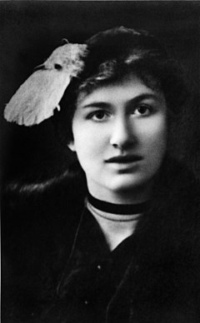
Edith Södergran
(1892-1923)
The Stars
When night comes
I stand on the steps and listen,
stars swarm in the yard
and I stand in the dark.
Listen, a star fell with a clang!
Don’t go out in the grass with bare feet;
my yard is full of shards.
Hope
I want to let go –
so I don’t give a damn about fine writing,
I’m rolling my sleeves up.
The dough’s rising…
Oh what a shame
I can’t bake cathedrals…
that sublimity of style
I’ve always yearned for…
Child of our time –
haven’t you found the right shell for your soul?
Before I die I shall
bake a cathedral.
Edith Södergran poetry
fleursdumal.nl magazine
More in: Archive S-T, Södergran, Edith
.jpg)
William Shakespeare
(1564-1616)
THE SONNETS
65
Since brass, nor stone, nor earth, nor boundless sea,
But sad mortality o’ersways their power,
How with this rage shall beauty hold a plea,
Whose action is no stronger than a flower?
O how shall summer’s honey breath hold out,
Against the wrackful siege of batt’ring days,
When rocks impregnable are not so stout,
Nor gates of steel so strong but time decays?
O fearful meditation, where alack,
Shall Time’s best jewel from Time’s chest lie hid?
Or what strong hand can hold his swift foot back,
Or who his spoil of beauty can forbid?
O none, unless this miracle have might,
That in black ink my love may still shine bright.
![]()
kempis.nl poetry magazine
More in: -Shakespeare Sonnets
.jpg)
Ton van Reen
EZELS ZIJN VERACHTELIJKE DIEREN
Ezels zijn verachtelijke dieren
als ze worden geslagen
huilen ze als vrouwen die worden geslagen
als ze bijna sterven van dorst
krijsen ze als verongelijkte kinderen
Ezels zijn het uitschot van de dieren
als ze oud zijn en overbodig
en de mensen hen laten creperen
stellen ze zich aan als mensen en vragen ze aandacht
Dienstbaarheid is hun lot
daarom is het belachelijk
hoe luid ezels om dankbaarheid vragen
ze vergeten dat ze slaven zijn
die zijn geschapen door de duivel
en daarom alleen verachting verdienen
Omdat ezels zo achterlijk zijn
blijven ze luid om aandacht vragen
vroeg in de ochtend hoor je ze tekeergaan
ver weg, vastgebonden in droog land
ezels willen maar niet begrijpen
dat ze levende wezens zijn zonder ziel
en het daarom verdienen te creperen
Ton van Reen: De naam van het mes. Afrikaanse gedichten
kempis.nl poetry magazine
More in: -De naam van het mes, Ton van Reen
.jpg)
Mikhail Yuryevich Lermontov
(Михаи́л Ю́рьевич Ле́рмонтов 1814 – 1841)
![]() The reed
The reed
A fisherman sat humming
Beside a stream one day
And watched the wind of morning
The reeds and grasses sway.
He cut a reed, and, making
A hole in it or two,
To one end held a finger
And in the other blew.
The reed to life was wakened,
It spoke up with a sigh.
Was’t voice of wind or maiden,
Its gentle voice and shy?
"0 fisherman," it begged him,
"Do not torment me so.
0 fisherman, I pray you,
Hear out my tale of woe.
"A fair and lovely maiden
But motherless I was.
I bloomed, but bloomed unwanted,
By no one loved, alas!
My father he remarried
And took a witch to wife.
I called on death to claim me
So wretched was my life.
"The witch she had a dearly
Beloved son, had she,
A worthless rogue and scapegrace
Who fooled young maids was he.
I went with him one evening
To walk beside the stream
And watch its waters mirror
The sun’s last dying gleam.
"My love in vain he begged forþ
Him and his pleas i spurned.
Gold coins to me he offeredþ
In ire from him I turned.
Then with his knife he struck me.
He struck me in the breast.
A grave he dug and put me
There on the bank to rest.
"And o’er my grave soon after
There grew a slender reed,
And in it live the sorrows
That made my young heart bleed.
0 fisherman, pray leave me,
Do not disturb my sleep.
Alack, you cannot help me
And have not learnt to weep!…"
.jpg)
Mikhail Lermontov poetry
kempis.nl poetry magazine
More in: Archive K-L
.jpg)
Marcel Proust
(1871-1922)
Schumann
Your old garden receives your friendship well
Understands the boys whistling from their nests in the hedges
Your step-loves for so many wounds
Schumann, pensive soldier disappointed by war.
The happy pregnant breeze, or passage of doves,
The scent of jasmine submerged in big shadow,
The child reading the future in the hearth’s flames,
The clouds or the wind speak to your grave heart.
Formerly your tears ran with the cries of the carnival
Or mixed their softness with bitter victory
Whose insane outburst still shudders in your memory;
You can cry without end: It is to your rival.
Towards Cologne the Rhine rolls its sacred water.
Ah, you sing the feast days merrily on its edges!
– But broken sorrow, you are deadened…
Tears rain in enlightened dark.
You dream where dead see, where faith is thankless,
Your hope is in flowers and powder is their crime…
Then a heart-rending bolt of lightning reawakens,
When the new thunderbolt strikes you for the first time.
Flow, fill with fragrance, march to drums or be beautiful!
Schumann, confidant of love and flowers,
Between your joyous quays, holy rivers sorrow,
Pensive garden, warm, fresh and faithful,
Where moon lilies and swallows kiss,
Army marches, child dreams, woman weeps!
.jpg)
Marcel Proust poetry
fleursdumal.nl magazine
More in: Archive O-P, Marcel Proust, Proust, Marcel
.jpg)
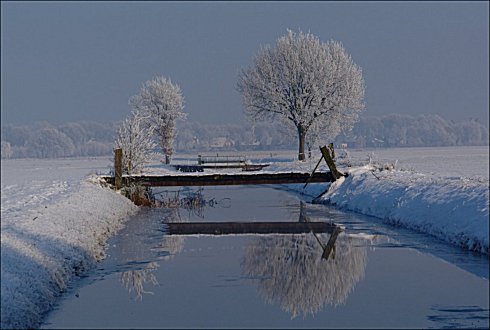
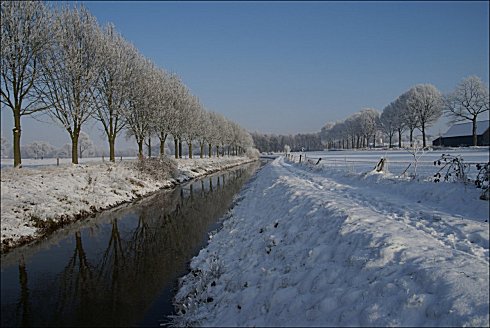
Adelbert von Chamisso
(1781-1838)
Nacht und Winter
Von des Nordes kaltem Wehen
Wird der Schnee dahergetrieben,
Der die dunkle Erde decket;
Dunkle Wolken zieh’n am Himmel,
Und es flimmern keine Sterne,
Nur der Schnee im Dunkel schimmert.
Herb’ und kalt der Wind sich reget,
Schaurig stöhnt er in die Stille;
Tief hat sich die Nacht gesenket.
Wie sie ruh’n auf dem Gefilde,
Ruh’n mir in der tiefsten Seele
Dunkle Nacht und herber Winter.
Herb’ und kalt der Wind sich reget,
Dunkle Wolken zieh’n am Himmel,
Tief hat sich die Nacht gesenket.
Nicht der Freude Kränze zieren
Mir das Haupt im jungen Lenze,
Und erheitern meine Stirne:
Denn am Morgen meines Lebens,
Liebend und begehrend Liebe,
Wandl’ ich einsam in der Fremde.
Wo das Sehnen meiner Liebe,
Wo das heiße muß, verschmähet,
Tief im Herzen sich verschließen.
Herb’ und kalt der Wind sich reget.
Dunkle Wolken zieh’n am Himmel,
Und es flimmern keine Sterne.
Wie sie ruh’n auf dem Gefilde,
Ruh’n mir in der tiefsten Seele
Dunkle Nacht und herber Winter.
Leise hallen aus der Ferne
Töne, die den Tag verkünden. –
Wird der Tag denn sich erhellen?
Freudebringend dem Gefilde
Wird er strahlen, Nacht entschweben,
Herber Winter auch entfliehen,
Und des Jahres Kreis sich wenden,
Und der junge Lenz in Liebe
Nahen der verjüngten Erde.
Mir nur, mir nur ew’ger Winter,
Ew’ge Nacht, und Schmerz und Thränen,
Kein Tag, keines Sternes Flimmer!
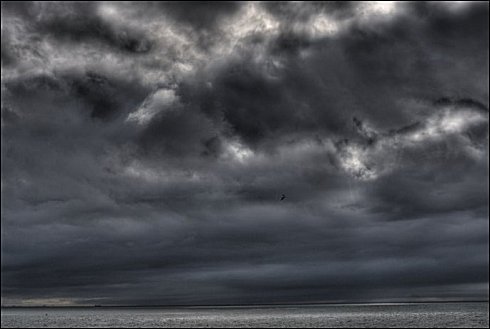
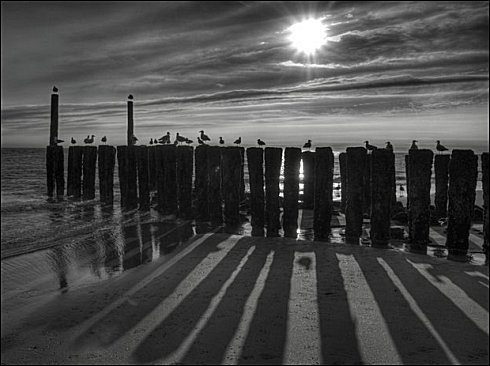
Photos ©Hans Hermans – Natuurdagboek Januari 2011
kempis.nl poetry magazine
More in: Archive C-D, Hans Hermans Photos, MUSEUM OF NATURAL HISTORY - department of ravens & crows, birds of prey, riding a zebra, spring, summer, autumn, winter
.jpg)
Lola Ridge
(1873-1941)
TO ALEXANDER BERKMAN
Can you see me, Sasha?
I can see you….
A tentacle of the vast dawn is resting on your face
that floats as though detached
in a sultry and greenish vapor.
I cannot reach my hands to you…
would not if I could,
though I know how warmly yours would close about them.
Why?
I do not know…
I have a sense of shame.
Your eyes hurt me… mysterious openings in the gray stone of your face
through which your spirit streams out taut as a flag
bearing strange symbols to the new dawn.
If I stay… projected, trembling against these bars filtering
emaciated light…
will your eyes… that bore their lonely way through mine…
stop as at a friendly gate…
grow warm… and luminous?
… but I cannot stay… for the smell…
I know… how the days pass…
The prison squats
with granite haunches
on the young spring,
battened under with its twisting green…
and you… socket for every bolt
piercing like a driven nail.
Eyes stare you through the bars…
eyes blank as a graveled yard…
and the silence shuffles heavy dice of feet in iron corridors…
until the day… that has soiled herself in this black hole
to caress the pale mask of your face…
withdraws the last wizened ray
to wash in the infinite
her discolored hands.
Can you hear me, Sasha,
in your surrounded darkness?
LOLA RIDGE POETRY
kempis.nl poetry magazine
More in: Archive Q-R, Ridge, Lola
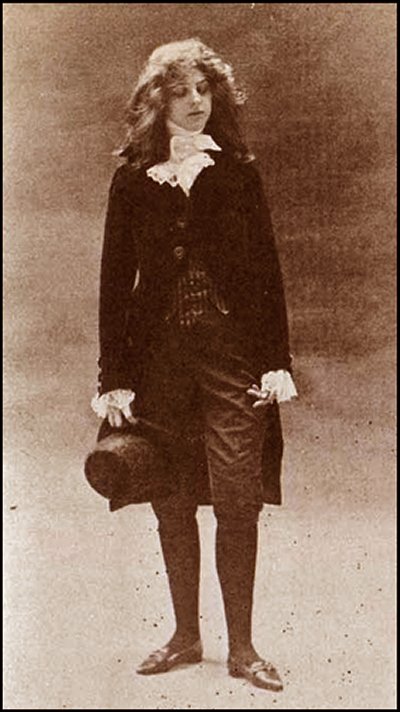
Renée Vivien
(1877-1909)
Bacchante triste
Le jour ne perce plus de flèches arrogantes
Les bois émerveillés de la beauté des nuits,
Et c’est l’heure troublée où dansent les Bacchantes
Parmi l’accablement des rythmes alanguis.
Leurs cheveux emmêlés pleurent le sang des vignes,
Leurs pieds vifs sont légers comme l’aile des vents,
Et la rose des chairs, la souplesse des lignes
Ont peuplé la forêt de sourires mouvants.
La plus jeune a des chants qui rappellent le râle :
Sa gorge d’amoureuse est lourde de sanglots.
Elle n’est point pareille aux autres, – elle est pâle ;
Son front a l’amertume et l’orage des flots.
Le vin où le soleil des vendanges persiste
Ne lui ramène plus le génëreux oubli ;
Elle est ivre à demi, mais son ivresse est triste,
Et les feuillages noirs ceignent son front pâli.
Tout en elle est lassé des fausses allégresses.
Et le pressentiment des froids et durs matins
Vient corrompre la flamme et le miel des caresses.
Elle songe, parmi les roses des festins.
Celle-là se souvient des baisers qu’on oublie…
Elle n’apprendra pas le désir sans douleurs,
Celle qui voit toujours avec mélancolie
Au fond des soirs d’orgie agoniser les fleurs.
Sad Bacchante
Day no longer pierces, with proud arrow and lance,
The woods, amazing in their beauty nocturnal.
This is the turbid hour when Bacchantes dance,
Amidst oppressive rhythms, languid and vernal.
Their hair tangles, dripping with the blood of the vines;
Their lively feet, like the wings of the wind, are light,
And their rosy flesh, the suppleness of their lines,
Imbues the forest with ever-shifting delight.
The youngest sings a song which calls to mind a wail:
Her amorous breast, with deep sobbing, is heavy.
She is not at all like the others – she is pale.
Her face has the stormy bitterness of the sea.
The wine, where the sun of the season will persist,
No longer brings generous oblivion now;
She is half-drunk, but her sorrow will not desist
And a wreath of dark leaves surrounds her pale brow.
To all in her, false gaiety brings weariness,
And the presentiment of cold and hard daybreak
Comes to spoil the glowing sweetness of the caress.
Among the festive roses she dreams, though awake.
What she remembers are the kisses they forget…
She cannot learn to desire without feeling grief,
She who gazes still, with melancholy beset,
At flowers dying after night orgies, so brief.

Renée Vivien poetry
kempis.nl poetry magazine
More in: Archive U-V, Vivien, Renée
Thank you for reading Fleurs du Mal - magazine for art & literature